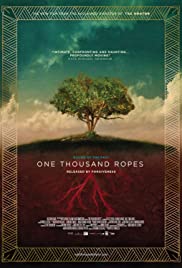
ONE THOUSAND ROPES
New Zealand, 2017, 98 minutes, Colour.
Uelese Pataia, Frankie Adams, Lagi Farani, Beulah Koale, Nathaniel Lees, Ena Petaia.
Directed by Tusi Tamasese.
This comment on the IMDb from an enthusiastic blogger offers a perceptive look at what One Thousand Ropes is doing, its insights into someone lives in Wellington, traditions, adaptations to New Zealand society.
A dark and gloomy but revealing view of life in an Urban Samoan ghetto
alexdeleonfilm13 February 2017
One Thousand Ropes, a Samoan language film from from New Zealand. Day number 2 at Berlin 2017 was marked by two films in languages hardly ever heard on cinema screens. The Lingala language from Congo and The Polynesian language, Samoan, from New Zealand. To take the second first, this is probably the first time the Samoan language has been heard in a feature film. (for the non-linguists out there there, Samoan is vowel rich but consonant poor Polynesian language Related to Tahitian and Hawaiian)
Tusi Tanasese's film focusing on the dark domestic life of an urbanized Samoan family in Wellington, New Zealand where Samoans constitute the largest non-white community next to the indigenous Maoris, is almost claustrophobic in that most of the action takes place in extreme closeups within the confines of a single house which also serves as the family bakery business. Maea, the pater familias of this Samoan clan, is an older man who has a mistress and an official "woman" (wife) as well, and a son he considers a wimp and a coward who assists him in the bakery. He is also a part time healer or curandero and assists in the extra hospital delivery of babies when called upon by women who don't trust white medical services. An important part of the birthing ritual is the burial of the placenta in the ground, presumably to guarantee the propagation of the race. If nothing else this film provides a no-holds barred at times painful Insiders look into the lives of an impoverished Island people now living under spare third world conditions in an urban Samoan ghetto in the capital of New Zealand. There are no smiles or light moments in this gloomy picture of life in the Ghetto raw, but the stoic figure of white haired Maea is somehow hypnotic and brought enthusiastic applause at the end from a Packed house of the Saturday night showing at the lavish ZOO Palace cinema in West Berlin. The title refers to the myriad connections between people and the film is in the prestigious Panorama section of the festival. The stoic Big Daddy of the story, Maea, is played by Uelese Petaia, a professional Samoan actor who is so convincing he seems to be an amateur recruited from the local community. And That is saying something.